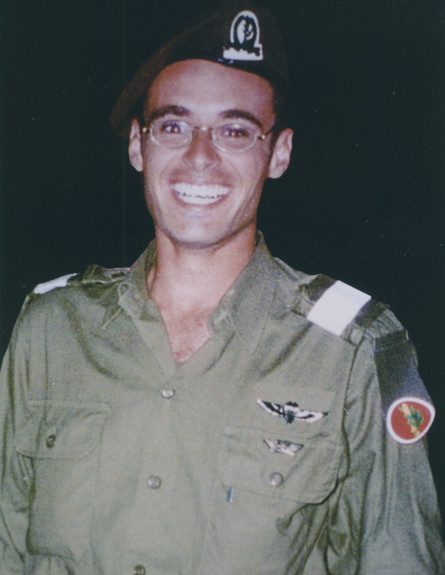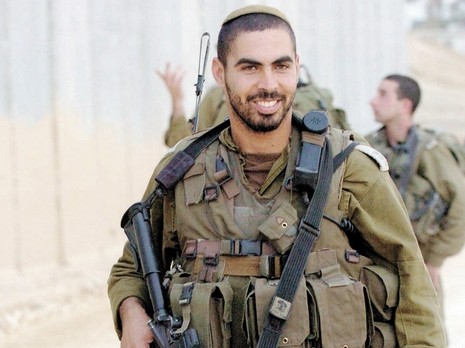


In memory of Uriel and Eliraz Peretz
Uriel was born in Ofira, 2nd of Kislev, 5737 (November 24, 1976). Fell in Lebanon, 7th of Kislev, 5759 (November 25, 1998)
Eliraz was born in Ofira, 8th of Av, 5738 (August 11, 1978). Fell in the Gaza Strip, 11th of Nisan, 5770 (March 26, 2010)
In the heart of Jebalya, during a lull in the fighting, the two brothers Eliraz and Elyasaf meet. They hug each with relief, a hug that has folded within it sweet childhood memories and longings for their brother Uriel, who fell in Lebanon. This family hug in this surrealistic landscape will be etched on Elyasaf’s soul and will take on a chilling meaning after the death of Eliraz, a short time later in the Kisufim Corridor.
“Looking for Them” is in memory of Uriel Peretz who fell in combat in Lebanon (1998) and Eliraz Peretz who fell in a terrorist encounter in the Gaza Strip (2010).
Uriel Peretz
Uriel, the oldest son of Miriam and Elazar, was born on the settlement of Ofira in Sinai. Here he developed a love of nature, which was expressed over the years in hikes throughout Israel, orienteering, scuba diving and teaching youth about the Land of Israel.
Already in his teenage years, his idealistic personality was clear to all. Every step he took expressed his faith in Torah, the Land of Israel and the Jewish People. In his Bar Mitzvah speech, he explained the importance of the three foundations that have been passed on down the generations and inherited by his family: the Torah of Israel, on which he was brought up; the Land of Israel, in which he was born and which he took in during his many hikes; and the Jewish People, which he was proud to be a part of. In this spirit, he was always active in the community, he was a counselor in Bnei Akiva in Givat Zeev and in the Ramot neighborhood and he helped in the management of the Darkei Noam Synagogue, in which his father was also active.
 Uriel Peretz Z"l |
As he grew up, his future in the army became clear to him. He studied at the military command college in Or Tzion, where he was considered to be a leader and a motivator in the Masuot Company in which he was studying. Yanon, a classmate of his in the mechina, recalled: “When we gave you the nickname of “the king” it so suited you because you were a special guy who knew how to relate to other people and who would worry about others before himself. Your motto was ‘Fiirst everyone else and then me’. On the other hand, you were the first to volunteer for every mission.”
In November 1995, Uriel joined the army. After insisting on serving in the Golani commandos, he was finally accepted into the trials. Uriel successfully passed the trials and completed the combat basic training, where with a partner he set a new record for orienteering—the pair completed a distance of 25 km in less than four and a half hours.
At the end of 1997, Uriel was sent to an officers course. The other cadets were very impressed by his leadership ability, his personal example, willingness to help his friends and his derech eretz. In March 1998, on completing the course, Uriel said: “We were chosen to be officers for a reason; we were chosen to educate; we are worthy to carry out that task. We will change this country whether we want to or not.”
As part of his army service, Uriel contributed from his free time to teach yeshiva high school students in Kiryat Arba about the military heritage of the Golani Brigade and of the IDF as a whole.
Uriel was killed by a roadside bomb near the village of Markava in Southern Lebanon together with Staff Sergeant Nitzan Baldran. He left behind his parents, three brothers and two sisters.
His brother Eliraz, who was killed in battle 12 years later, eulogized him: “You, Uriel, every time you said to go on, not to give up, to be better, to always invest more, to be the best…You believed in the path that is correct, more difficult and sometimes one pays a price for that. The price of one’s life. You always sacrificed everything, you invested your all, everything. You also took care of your soldiers—that they should be ready, alert, the best. You radiated confidence… we are in pain, we are sad and we promise—that is how we will remember you, that way of life. Not memories in photographs, but a way of life and an attitude of love for all aspects of life.”
Texts written by Uriel and found after his death clearly describe a figure who had the respect of those around him: “With all of the thorns and bushes that are stuck into my body, one could plant a garden of one meter by one meter. But these are not just thorns, they are the thorns of the Land of Israel. The place where a man goes when he is in pain— there are his roots." (Uriel wrote that he is going to two places in Jerusalem—Mount Herzl and the Wailing Wall).
It is these values that keep his family going. His mother Miriam gave a lecture on leadership to an audience of soldiers, officers and youth. Letters written by Uriel’s soldiers and commanders were gathered into a booklet called “Might and Humility“ which served as the basis for her lecture: “The figure of a commander”.
Eliraz Peretz
Eliraz Peretz was born to Miriam and Elazar in Ofira in the Sinai and as a result his childhood years were spent in the wild desert setting and in the sea. When the peace accord was signed with Egypt the family moved to Givat Zeev near Jerusalem. Eliraz graduated from Himmelfarb High School in Jerusalem and deferred going into the army for a year in order to study at the Otsem mechina at Atzmona in Gush Katif. This period had a decisive meaning in his life while his personality formed and solidified from both a military perspective and a spiritual one. From a loving and cuddly child he became a youth who sought a life of meaning on both the personal and national levels.
In 1998, after completing the mechina, he joined the army and served in the Golani commandos. Several months later his brother Uriel z”l was killed in Lebanon. On Uriel’s grave, he promised to follow in his path and later entered an officers course. While in the army, he filled many roles, including platoon commander, company commander, a training class commander and Assistant Commander of Battalion 12.
 Eliraz Peretz Z"l |
During his army service, Eliraz wrote to his friend: “You have to give everything… If you love, then all the way. If you are a friend, then all the way. If you are a combat soldier, then all the way and give everything… This is what is called in fancy language (I don’t know if you will like this) 'self-sacrifice'. In other words, you give from your body, from your strength, from your money, from your heart for the sake of someone or something else that is not you! And the extraordinary thing is that you aren’t doing it from time to time, but all the time. Every day, every minute”.
Eliraz’s total love and his infinite dedication were also described by his wife Shlomit, who recounted that every night, after saying the Shema before going to bed, Eliraz would say the following:
"Please my Lord, please my Lord
Make me into a vessel for your calling.
In the place where hate nests
Let me plant love;
In the place where insult is – forgiveness;
In the place where darkness is – light;
In the place where sadness is – joy".
Eliraz was killed in an encounter with terrorists in the Gaza Strip when a bullet exploded a grenade that he carried in his vest. Also killed was Staff Sergeant Ilan Sviatkovsky; two other soldiers were wounded. Eliraz was buried in the military section of Mount Herzl, near the grave of his brother Uriel z”l. He left behind his mother, two brothers and two sisters, a wife and four children.
Interview with Miriam Peretz, mother or Uriel and Eliraz
Miriam describes the last family trips before the brothers' deaths, the meeting between Eliraz and his brother Elyasaf during Operation Cast Lead and her longing for her two sons, alongside her brave choice to cling to life.
Thoughts from Neko Productions who created the film
Before starting to work on the film, it was important for us to produce a clip that will clearly and comprehensively convey this complex and sad story. We dealt with the big question of how to fully commemorate both brothers in such a short film. The answer quickly appeared—by way of the perspective and experiences of the third brother, Elyasaf.
Instead of writing a script on the Peretz family, we chose to work in the opposite direction: to let the Peretz family tell us their story.
In a long nighttime interview, we recorded a conversation with Elyasaf, in which he spoke of his memories of his older brothers and the experience of losing them. Using these recordings, we created the script.
The film takes place during Operation Cast Lead and focuses on the moment when Elyasaf and Eliraz meet by accident during the fighting. They got so excited that they started wrestling with each other at first and then powerfully hug each other. From within their hug, the viewer travels with Elyasaf on a journey into his memories.
Animation has the power to reflect memory in a way that a regular clip is unable to. Using this dependable medium, “we brought to life” the memories of Uriel and Eliraz. In this way, we commemorated and honored these two special people. Through memory, we tried to mediate the experience of loss, since one of the strongest elements of loss is the blurring of boundaries between reality and memory. What is remembered of that person we loved so much? Is this the only place in which this person is “alive”? Where do we start to forget? All these are questions that we asked during the process.
Production: Neko Productions
Producer: Lirit Rozensweig Topaz
Concept and direction: Ayal Rash
Coordination of production: Amit Sidi
Visual supervisor: Liron Topaz
Art director: Daniel Dulitzki
Story board and art: Hana Majulsans
Animation and composition: Lucas Romero
Alberto Koriliza Ovda
Classic animation: Wero Romero
3D and composition: Uri Oferi
Original music: Daniel Markowitz
Musical editing: Sagi Shachar